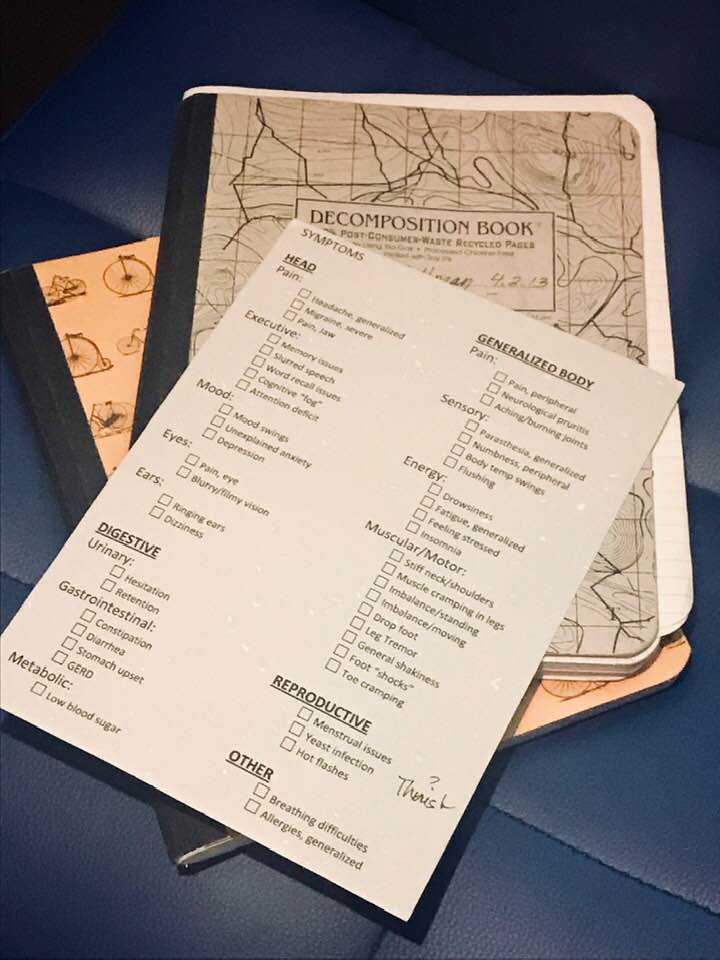Need to Know: What Is a Symptom Journal?
Written by |

Editor’s note: “Need to Know” is a series inspired by common forum questions and comments from readers. Have a comment or question about MS? Visit our forum.
This week’s question is inspired by the forum topic “How do you feel about journaling? It’s a good way to keep track of your MS symptoms!” from June 7, 2018.
Recently, I ran into my daughter’s friend, who I’ve known since she was in middle school. She’s now in college. We were at the local diner where she worked, and she shared that she’d been recently diagnosed with fibromyalgia. Knowing I live with MS, she asked me how I dealt with chronic illness.
Well, that’s a big question.
“Let’s talk over coffee,” I suggested.
I’m hopeful. During our talk the next day, I was impressed with her proactive self-advocacy since her diagnosis last winter. This is a smart girl who’s no stranger to chronic illness (she also has asthma), so at least there’s the silver lining of early lived experience. She’s also a fighter, though you’d never presume it by looking at her.
I’d planned to share what worked for me in early post-diagnosis, but then she asked me, “Do you keep a symptom journal?”
Yes! It was one of the first things I did following diagnosis, during the major flare-ups and symptoms (inability to read, leg tremors, paresthesias, cognitive fog, speech issues). It finally coaxed me into getting MRIs, lumbar punctures, blood draws, evoked potential tests, and more to solve the mystery of what was wrong with me.
Keeping a symptom journal is one of the best things I did post-diagnosis. It helped me in the transitions from feeling sick and being undiagnosed through feeling sick post-diagnosis, feeling gradually better once treated, and understanding the differences between flares and pseudoexacerbations in the years to follow.
What is a symptom journal?
Not to state the obvious, but it’s a chronicle of symptoms you experience, usually on a daily basis.
Three ways to do this are:
- Write your symptoms in a physical diary or journal
- Enter your symptoms into a database or spreadsheet you create on your computer
- Record your symptoms using any of the symptom tracking apps you can find for your handheld devices

Symptom journals. (Photo by Tamara Sellman)
What I did
I bought a bunch of notebooks and clipped a pen to them, and wrote in them every night at bedtime.
I found I had a lot more symptoms than those that were the most prominent. I also found I was so tired at night that my memory wasn’t particularly reliable; I was afraid I might overlook something. I made a checklist I could review to offset this concern.
I filled out several of these journals until my MS stabilized in remission. I still have these journals to refer to, should I flare again.
Components of a symptom journal
You can include anything you wish in a personal symptom journal you create on your own.
If you’re using an app, you may be limited in what you include, or you might find you have some customizing capabilities and can add or subtract entry fields (it will depend on the app).
I recommend keeping track of more than just symptoms, by the way. They are only one part of the picture. Keeping track of these other influences over the course of your MS can be helpful in understanding symptom triggers and for identifying the beginnings (and endings!) of relapses.
- Symptoms: you can start with your chief complaints — the ones that sent you to the doctor in the first place — and add more as you become aware of them; I was unaware that the fatigue I felt, for instance, wasn’t normal)
- All medications: prescription, over-the-counter, supplements, vitamins, CBD. Keep track of frequency, dosage, and what they are used for, and share this entire list with your MS specialist every time you see them.
- Side effects: if you’re aware of any
- Mood: depressed, anxious, blunted, angry, happy — all of them!
- Sleep: bedtime and rise time, hours slept, hours not slept, dream behaviors, daytime sleepiness
- Stressful events: both positive and negative; for instance, a child’s college graduation or vacation travel can be as stressful as a workplace altercation or quarrel with a loved one
- Exercise: what kind, for how long, how you felt before/during/after
- Diet: paying attention to what you eat, including how much and when, can be useful; also, record how much water you drink
Next week, I’ll share ideas for expanding your symptom journal.
Has keeping track of your symptoms helped you to better manage your MS? Post your replies in the comments below or at the original “How do you feel about journaling? It’s a good way to keep track of your MS symptoms!” forum entry.
***
Note: Multiple Sclerosis News Today is strictly a news and information website about the disease. It does not provide medical advice, diagnosis, or treatment. This content is not intended to be a substitute for professional medical advice, diagnosis, or treatment. Always seek the advice of your physician or other qualified health provider with any questions you may have regarding a medical condition. Never disregard professional medical advice or delay in seeking it because of something you have read on this website. The opinions expressed in this column are not those of Multiple Sclerosis News Today or its parent company, Bionews Services, and are intended to spark discussion about issues pertaining to multiple sclerosis.



Paula Johnston
Thank you for your tips. My husband helps , by not letting me forget or miss some symptoms. He seems to notice more than I do ... eg. dragging my toes , moods , fatigue .
You see I sometimes don't notice or like to sugarcoat changes . So we keep a joint notebook .
Paula Johnston
Tamara Sellman
Hi Paula,
that's a great tip, having your partner keep an eye out for symptoms, too. It's true, we might not notice some things. I have a strange speech pattern I'm not aware of when I'm having a relapse; only my husband can tell me it's happening. I appreciate the tip!
Tamara